De Novo Data Center
De Novo offers colocation in one of the largest data centers in Ukraine of TIER III compliance level
It is the only data center in Ukraine having a modular structure. Each module is a physically separated domain connected to a joint energy distribution and microclimate support systems.
The De Novo Data Center was commissioned in November 2010. In 2017 launched the second shift of facilities. The total capacity of the Data Center is 360 rack-spaces.
Today, the company hosts the country's largest banks and is also the site for the biggestIaaS cloud in Ukraine.
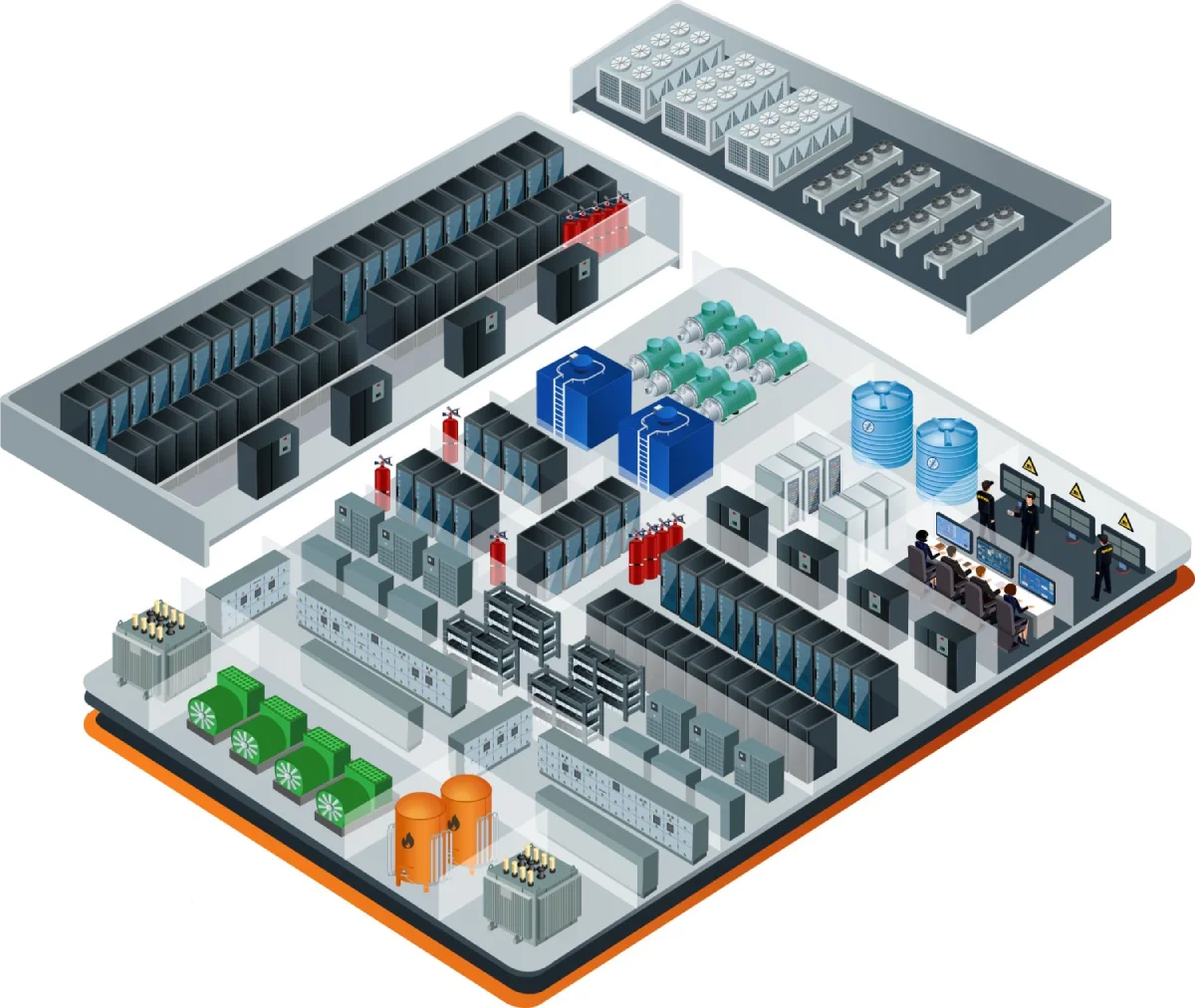
Reliability level Tier III – Tier IV
- Component redundancy - N+1.
- Availability of services - 99.98%.
- Maximum allowed downtime - 1.6 hours per year. De Novo data center operates without a single shutdown during the whole period of its existence.
- Uninterrupted cooling.
- Two active resource allocation routes.
- Hot replacements for "vital" resources.
- The number of employees per shift: more than 2 engineers.
- Technical support in 24/7 mode.
- Allocation to screened dedicated modules.
DC FROM INSIDE
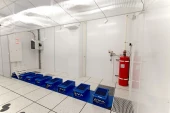
Shielded Module from inside
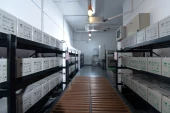
Rechargeable batteries
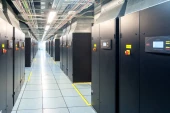
Modules air conditioning
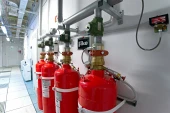
Gas fire extinguishing
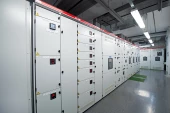
Electrical control room
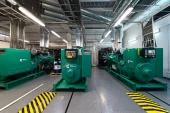
Diesel generator sets
Presentation "De Novo Data Center"
De Novo offers colocation in one of the largest data centers in Ukraine of TIER III compliance level.
It is the only data center in Ukraine having a modular structure. Each module is a physically separated domain connected to a joint energy distribution and microclimate support systems.
DIFFERENCES BETWEEN DC–1 AND DC–5
De Novo data center is divided into two physical blocks in which the processes and metrics differ according to the contract.
DC–1 is the only data center in Ukraine having a modular structure.
Each module is a physically separated domain, which consists of individual shielded cameras connected to the engineering infrastructure.
DС–5 is intended for placement of the equipment in the joint engine room.
The engine room consists of the zones of presence of telecom operators in DC–1, the dispatching system and the unshielded cameras connected to the system of power supply of DC–1,. All other systems are on premise.
De Novo DC Certificates
The infrastructure of the De Novo data center has received government certificates and comply with all data security requirements. All of the above is confirmed by our own data center's impeccable work, which had zero downtime since 2010.
De Novo`s cyber security is certified ISO27001, ISO 27701, ISO 27017 and ISO 27018.
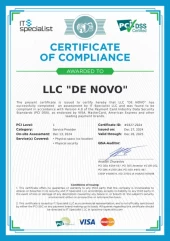
Data center compliance with PCI DSS requirements
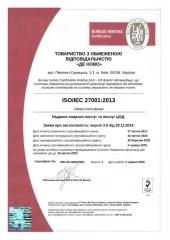
ISO/IEC 27001 compliance
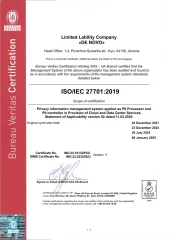
ISO/IEC 27701 compliance (extended ISO 27001)
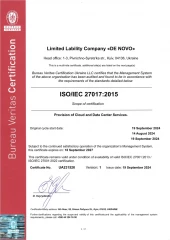
ISO/IEC 27017 compliance
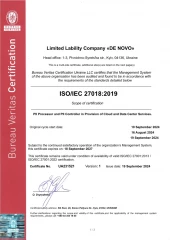
ISO/IEC 27018 compliance

DC block "L" Infrastructure Government Certificate of compliance

DC block "S" Infrastructure Government Certificate of compliance
Whitepaper: How to choose a reliable Data Center? Overview of key parameters
GET AN OFFER
What is a Commercial Data Center?
A data center is a specialized building or complex of buildings designed to house and operate a large number of servers, storage systems, network equipment and other computing equipment. Today, data centers are the most important objects of the global digital infrastructure, providing storage, processing and transmission of huge amounts of information on a global scale. Reliable operation of IT equipment in server rooms is ensured by the uninterrupted operation of the engineering infrastructure. The main components of such infrastructure are:
• Precision cooling systems that ensure accurate (within tenths of a degree) temperature and humidity control in the premises;
• Power supply systems (uninterruptible power supplies - UPS, diesel generators - DGU, power distribution systems) that ensure continuous power supply in case of a power outage;
• Server and mounting cabinets and racks for direct placement of active IT equipment;
• Physical security and access control systems (ACS, video security, etc.);
• Automatic or automatic gas fire extinguishing systems and a number of other components.
All data centers can be divided into two broad categories: corporate and commercial. The former are usually created by a company or organization for its own needs. Commercial sites offer paid services for the reliable placement of server equipment to companies and organizations.
Main Tasks of the Data Center
The main tasks of a commercial data center are aimed at ensuring reliable, secure and efficient operation of client equipment. A modern complex provides customers with minimization of IT equipment downtime, reduction of capital expenditures for creation of their own data center, as well as the ability to quickly scale (increase or decrease) computing resources in accordance with the needs of the client. In addition, the data center operator ensures physical security of client systems and their technical monitoring (control of key operational parameters).
Why a Business Needs a Data Center
A commercial data center offers businesses a number of advantages that allow them to optimize their IT infrastructure and focus on key business processes. Also, often renting a data center (its server rooms, individual cabinets or rack spaces) helps the customer to reduce operating costs associated with electricity, cooling and maintenance of equipment, payment for the services of IT specialists, etc.
IT systems are also typically more reliable, as a good data center has multiple layers of protection against failures - redundant power, cooling systems, network connections, etc. The result is uninterrupted operation of all client IT systems and, consequently, availability of data and applications. In addition, commercial sites usually meet high standards of security and reliability, which are often confirmed by internationally recognized certificates.
This, in turn, enables customers to meet regulatory requirements for data processing. The choice of location is also important. If necessary, you can use, for example, data center in Kiev or data center in Lviv. Or you can rent capacity at two sites at once to provide additional redundancy and reliability.
Basic services of a commercial data center
Commercial data centers offer a wide range of services that allow companies and organizations of various sizes to place and maintain their IT equipment on reliable and secure sites. For example, the site of a large operator can offer for rent both individual server racks or cabinets, and entire server rooms, allowing the deployment of complex integrated IT infrastructures of customers. The service provider provides an equipped and safe place to place servers, data storage systems (DSS), network equipment of the client, provides stable power supply with redundancy, maintains optimal temperature conditions in server rooms, provides physical security, access control and monitoring. Additionally, cloud services, data protection services, Internet connection, data backup, protection against DDoS-attacks, technical support, maintenance and much more can be provided. The range of services can be quite broad, but still, first of all, it is services for the physical location of IT equipment.
Key Performance Indicators of Data Center
The performance of facilities is assessed by various indicators that reflect the reliability, performance and energy efficiency of the complex as a whole, as well as its individual subsystems. One of the most important parameters is uptime (uptime) or simply put - the reliability of the site. There are several approaches to assess this parameter. The most popular concept involves dividing data centers into four categories (TIER) according to their fault tolerance. This approach is followed, for example, by such internationally recognized organizations as Uptime Institute and ANSI/TIA (standard TIA-942).
Data center fault tolerance levels and their characteristics:
• TIER I. This is a basic level with minimal reliability requirements. Such a facility can fail unexpectedly due to technical problems or failure, and frequent scheduled shutdowns for equipment maintenance are also allowed. At the same time, it is the lowest cost option, suitable for companies for whom temporary loss of data and application availability is not critical.
• TIER II. A higher level of resiliency is maintained here by redundancy of some of the most critical components, yet such a facility may experience short-term outages due to breakdowns or scheduled maintenance. Data Center TIER II is more reliable than TIER I, but it also costs more.
• TIER III. This is a high level of reliability, which is sufficient for the vast majority of tasks related to critical business applications, the most sensitive data or even government services. It provides full redundancy of all critical components. Scheduled infrastructure maintenance does not require shutdown of TIER 3 data center subsystems. This site is suitable for most organizations that require maximum 24/7/365 availability of data and applications.
• TIER IV. Provides the highest level of reliability due to full redundancy of all components. Suitable for companies with extremely high reliability and availability requirements, but the cost of such a data center will be extremely high.
Data centers play an increasingly important role in today's digital economy. They provide reliable data storage and processing, which is essential for businesses and government services to function in a wide variety of areas and directions. Commercial data centers allow organizations of all sizes to deploy and operate IT resources without the need for capital investment in engineering infrastructure. However, selecting a data center for lease is a strategic decision that should be made with due consideration for the specifics of the business and its development plans.
